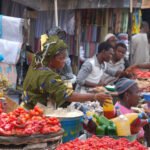Since Nigeria’s independence, the country has been struggling to get it right in leadership, national unity, and economy, with corruption undermining economic progress and impeding policy changes required for development.
Development Diaries reports that despite being one of Africa’s biggest oil exporters, Nigeria has struggled to achieve its full potential in 63 years.
Africa’s most populous country was ranked 161 out of 189 countries in the latest Human Development Index (HDI) published by the United Nations Development Programme (UNDP).
In fact, no sector of the economy can be said to be performing excellently well, with the country often described as having stunted growth.
Nigeria is characterised by a collapsed economy with a constantly devaluing currency, unchecked corruption, unabated insecurity, mass impoverishment and misery, and government’s ineptitude in addressing insecurity.
The country is also characterised by the collapse of infrastructure, failure to deliver free, fair and credible elections, impunity for human rights violations, mass dejection, and loss of hope which has led to ‘japa’ syndrome.
More pressing at the moment is the loss of hope in the present government as Nigerians still await President Bola Tinubu to alleviate the suffering brought upon them by the petroleum subsidy removal.
A fuel subsidy poll conducted by NOIPolls in June revealed that 73 percent of adult Nigerians nationwide lamented the negative impact of subsidy removal on their spending on other commodities.
Life in Nigeria today has become a living hell as prices of food, transportation and other essential commodities have gone up beyond the reach of the poor masses.
As the country marks another independence anniversary, Development Diaries calls on President Tinubu to ensure progress towards the achievement of Nigeria’s current development plan.
Nigeria’s new long-term development plan aims to ensure that the country attains a per capita GDP of U.S.$33,328 per annum.
Known as Nigeria Agenda 2050, it highlights the road map for accelerated, sustained and broad-based growth and development, and provides frameworks and approaches for reducing unemployment, poverty, inequality, and human deprivation.
On their part, citizens must also demand accountability and transparency from their leaders.
Photo source: J-No







